Filter by
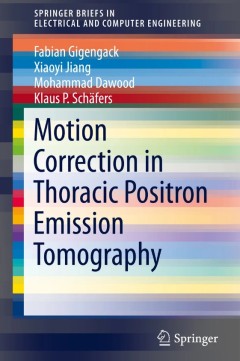
Motion Correction in Thoracic Positron Emission Tomography
Respiratory and cardiac motion leads to image degradation in Positron Emission Tomography (PET), which impairs quantification. In this book, the authors present approaches to motion estimation and motion correction in thoracic PET. The approaches for motion estimation are based on dual gating and mass-preserving image registration (VAMPIRE) and mass-preserving optical flow (MPOF). With mass-pre…
- Edition
- 1
- ISBN/ISSN
- 978-3-319-08391-9
- Collation
- XI, 88
- Series Title
- SpringerBriefs in Electrical and Computer Engineering
- Call Number
- -
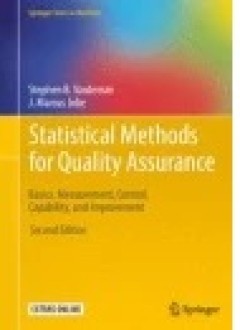
Statistical Methods for Quality Assurance
This book is a substantial revision of our Statistical Quality Assurance Methods for Engineers published in 1999 by Wiley. It has evolved with the Iowa State University course that originally motivated the writing of that first book and fairly accurately represents the current technical content of Industrial Engineering 361 at ISU. (The biggest exception to this is that Sect. 6.2 is not for…
- Edition
- -
- ISBN/ISSN
- 978-0-387-79106-7
- Collation
- -
- Series Title
- -
- Call Number
- -
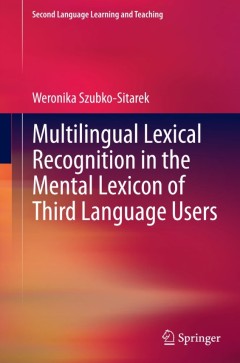
Multilingual Lexical Recognition in the Mental Lexicon of Third Language Users
The monograph constitutes an attempt to demonstrate that trilinguals should be considered as learners and speakers in their own right as opposed to L2 learners with a view to enumerating consequences this would bring to third or additional language teaching. Its theoretical part offers an insight into the structure of the multilingual mental lexicon which is a product of the interplay of a whol…
- Edition
- 1
- ISBN/ISSN
- 978-3-642-32193-1
- Collation
- XVI, 211
- Series Title
- Second Language Learning and Teaching
- Call Number
- -

Natural Computing Algorithms
The field of natural computing has been the focus of a substantial research effort in recent decades. One particular strand of this research concerns the development of computational algorithms using metaphorical inspiration from systems and phenomena that occur in the natural world. These naturally inspired computing algorithms have proven to be successful problem-solvers across domains as div…
- Edition
- 1
- ISBN/ISSN
- 978-3-662-43630-1
- Collation
- XX, 554
- Series Title
- Natural Computing Series
- Call Number
- -

Multi-hop Routing in Wireless Sensor Networks
This brief provides an overview of recent developments in multi-hop routing protocols for Wireless Sensor Networks (WSNs). It introduces the various classifications of routing protocols and lists the pros and cons of each category, going beyond the conceptual overview of routing classifications offered in other books. Recently many researchers have proposed numerous multi-hop routing protocols …
- Edition
- 1
- ISBN/ISSN
- 2191-8112
- Collation
- X, 69
- Series Title
- SpringerBriefs in Electrical and Computer Engineering
- Call Number
- -

The Twenty-First Century Commercial Space Imperative
Young addresses the impressive expansion across existing and developing commercial space business markets, with multiple private companies competing in the payload launch services sector. The author pinpoints the new markets, technologies, and players in the industry, as well as highlighting the overall reasons why it is important for us to develop space. NASA now relies on commercial partners …
- Edition
- -
- ISBN/ISSN
- 978-3-319-18929-1
- Collation
- -
- Series Title
- -
- Call Number
- -
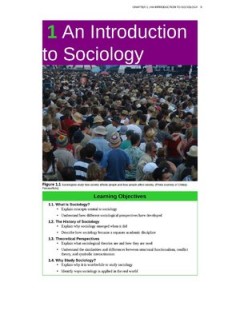
Introduction to Sociology
Published by OpenStax College, Introduction to Sociology was written by teams of sociology professors and writers and peer-reviewed by college instructors nationwide. This free online text meets standard scope and sequence requirements and incorporates current events, such as the Occupy Wall Street movement. The text is designed for the Introduction to Sociology course at any two- to four-year …
- Edition
- -
- ISBN/ISSN
- 9781938168017
- Collation
- -
- Series Title
- -
- Call Number
- 300 CON i

Emerging and Young Adulthood Multiple Perspectives, Diverse Narratives
The most distinctive feature of the Second Edition is its theoretical orientation coupled with a focus on understanding emerging and young adulthood from multiple perspectives. The updated and expanded book offers readers an opportunity to “listen to the voices” of emerging and young adults, parents, and employers, which is key to understanding this particular developmental period. In addit…
- Edition
- -
- ISBN/ISSN
- 978-3-319-11301-2
- Collation
- XII, 222
- Series Title
- -
- Call Number
- -
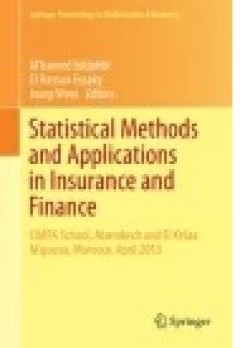
Statistical Methods and Applications in Insurance and Finance
This book is an outcome of the CIMPA-UNESCO-MESR-MINECO-MOROCCO research school entitled “Statistical Methods and Applications in Finance and Actuarial Science”. The research school, organized by the Cadi Ayyad University in Marrakech, in collaboration with the International Centre for Pure and Applied Mathematics (CIMPA), was held in Marrakech and Kelaat M’gouna between 8 and 20 Apr…
- Edition
- -
- ISBN/ISSN
- 978-3-319-30417-5
- Collation
- -
- Series Title
- -
- Call Number
- -
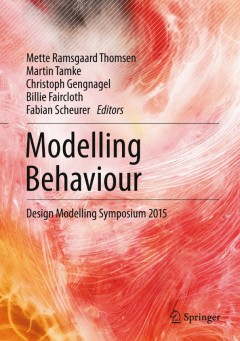
Modelling Behaviour
This book reflects and expands on the current trend in the building industry to understand, simulate and ultimately design buildings by taking into consideration the interlinked elements and forces that act on them. This approach overcomes the traditional, exclusive focus on building tasks, while posing new challenges in all areas of the industry from material and structural to the urban scale.…
- Edition
- 1
- ISBN/ISSN
- 978-3-319-24206-4
- Collation
- XXV, 544
- Series Title
- -
- Call Number
- -
 Computer Science, Information & General Works
Computer Science, Information & General Works  Philosophy & Psychology
Philosophy & Psychology  Religion
Religion  Social Sciences
Social Sciences  Language
Language  Pure Science
Pure Science  Applied Sciences
Applied Sciences  Art & Recreation
Art & Recreation  Literature
Literature  History & Geography
History & Geography